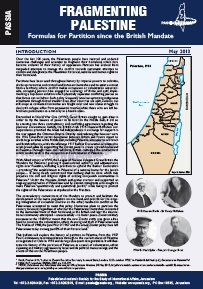FRAGMENTING PALESTINE Formulas for Partition since the British Mandate
Overview
Over the last 100 years, the Palestinian people have resisted and endured numerous challenges and attempts to fragment their homeland, which have become endemic of their history of oppression. Partition has evolved from misguided attempts to manage the conflict towards systematic attempts to contain and delegitimize the Palestinian historical, national and human rights to their homeland. Partitions have been used throughout history by imperial powers to colonize, divide up resources and control land between themselves and to assist a retreat from a territory; where conflict makes occupation or colonization unsustainable, occupying powers have engaged in a strategy of ‘divide and quit’, implementing a top-down solution which physically separates conflicting parties so that forces can withdraw. Such policy frequently involves uprooting indigenous inhabitants through forced transfer. Even after countries are split, violence can still erupt as contested territories are fought over and new states struggle to deal with refugee influx from population transfer, while those who are left behind face persecution as a minority in a hostile state. Entrenched in World War One (WWI), Great Britain sought to gain allies in order to tip the balance of power in its favor. In the Middle East, it did so by entering into three contradictory and conflicting agreements regarding the post-war environment. Initially, the British-Arab 1915 Hussein-McMahon correspondence promised the Arabs full independence in exchange for support in the war against the Ottoman Empire. Directly contradicting this however were the 1916 Sykes-Picot secret documents between Britain and France meant to divide large swathes of the Middle East, including Palestine, into spheres of French and British influence, while the infamous 1917 Balfour Declaration attempted to attain Jewish allies by supporting the Zionist plans to create a Jewish homeland in Palestine. Through these contradictions, Britain cultivated the environment which would result in the occupation and colonization of Palestine.
With Allied victory in WWI, the League of Nations delegated Great Britain the Mandate for Palestine,’ granting it quasi-colonial authority and administrative rights over Palestine, including a provision to uphold the Balfour Declaration– promising “the establishment in Palestine of a national home for the Jewish people… It being clearly understood that nothing shall be done which may prejudice the civil and religious rights of existing non-Jewish communities in Palestine.” Under the Mandate, British authorities oversaw and supported an ongoing appropriation of Palestinian land by Zionist immigrants who sought to make Palestine ‘quantitatively and qualitatively Jewish,’1 while failing to protect the rights of the Palestinians as stipulated in the Mandate. The contradictory commitment of the Mandate to protect and facilitate the development of the native population on one hand, and provide for the ongoing immigration of exclusivist Zionists on the other, resulted in conflict as the Palestinians attempted to resist this policy. Numerous plans to partition the country followed, regardless of whether the Palestinians themselves consented to the dismemberment of their homeland, as the British and later the international community attempted – unsuccessfully – to foster peace. Zionist military successes in the 1948 War meant that the new Zionist entity was given a free hand to continue the colonization, ethnic cleansing and theft of Palestinian land. The Nakba of 1948, the June War of 1967 and the Israeli Zionist policy have left Palestinians today owning just 8% of their historic land.2 This bulletin will explore the history of partition in Palestine, from the 1937 Peel Commission recommendations through to the current status of Palestine as negotiated at Oslo in 1993 and during subsequent renegotiations. It will illustrate the history of the partition of Palestine as a result of colonization, ethnic cleansing and military aggression by Israel and its political maneuverings, and the effects of this on the Palestinian people.

